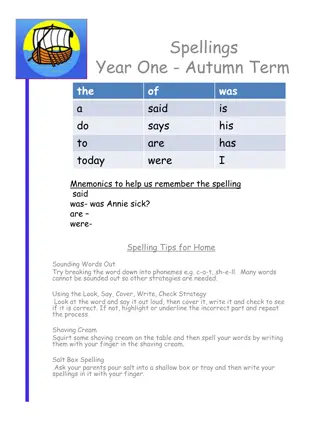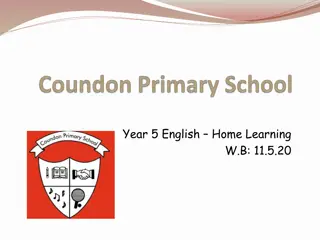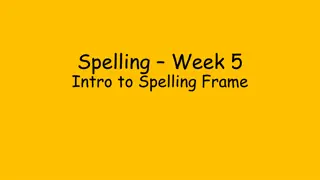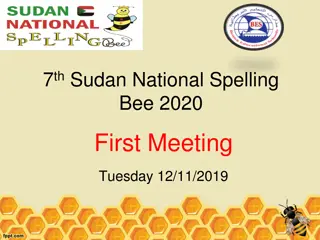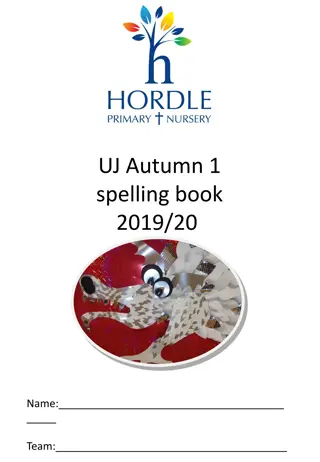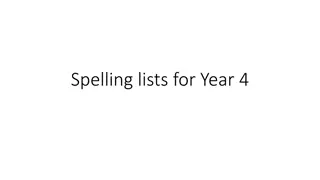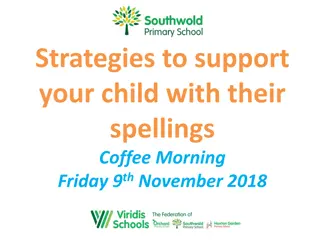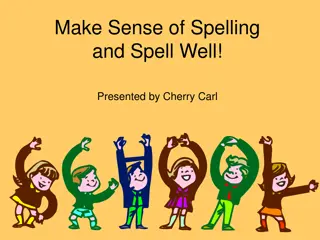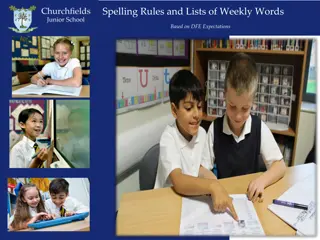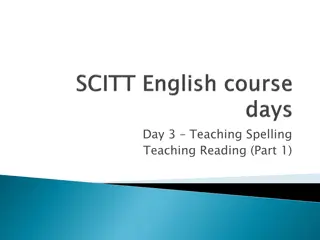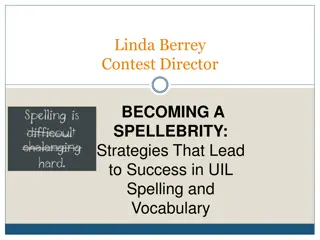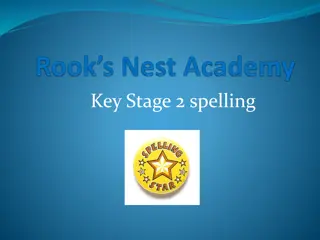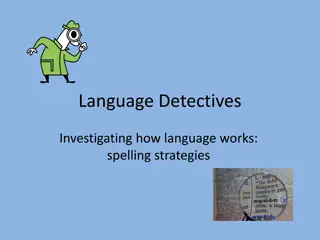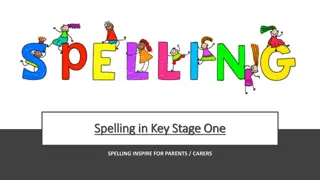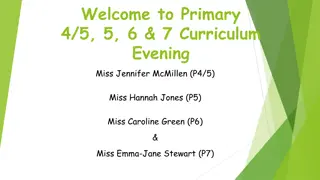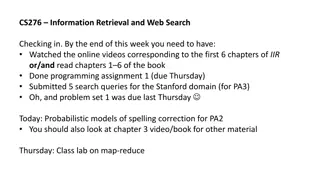Year 5 English - Spelling Practice and Debating Skills
Engage in spelling practice by choosing and mastering 10 words, explore the art of debating in a structured way, understand the language and techniques used in debates, and learn how judges score debates based on delivery, content, teamwork, and response to opposing arguments.
Download Presentation

Please find below an Image/Link to download the presentation.
The content on the website is provided AS IS for your information and personal use only. It may not be sold, licensed, or shared on other websites without obtaining consent from the author.If you encounter any issues during the download, it is possible that the publisher has removed the file from their server.
You are allowed to download the files provided on this website for personal or commercial use, subject to the condition that they are used lawfully. All files are the property of their respective owners.
The content on the website is provided AS IS for your information and personal use only. It may not be sold, licensed, or shared on other websites without obtaining consent from the author.
E N D
Presentation Transcript
Year 5 English Home Learning W.B: 27.4.20
Year 5 English Balanced Argument
Lesson 1 - Choose 10 words to practise for your spellings this week. Clouds Choose 10 words from the Year 3 and 4 list that you find tricky to spell Moons Choose 10 words from the Year 3 and 4 or the Year 5 and 6 list that you find tricky to spell Stars Choose 5 words from the Year 5 and 6 list and then use your reading book, a dictionary or words that interest you, choose another 5 words.
Lesson 1 - Spelling practise task Use the techniques suggested in Spellings Practise ideas to help you remember these spellings. Use this lesson to practise spelling these words. Practise these spellings each day and ask a parent or carer to test you on Friday. Good luck! How many did you get correct? Are there any words you would like to add to your list for next week?
Lesson 2 KS: To understand the skills used in a debate Watch this clip https://www.bbc.co.uk/newsround/47101056 During these unusual times, Mrs Ellis has become even more aware of the value of online learning and how useful keeping in contact via technology can be. She has asked if the current Year 5 children (that s you) will consider whether mobile phones should be allowed in school from September.
Lesson 2 What is a debate? KS: To understand the skills used in a debate Click on the image. Watch the first part of this debate. Are there any terms you don't understand?
Lesson 2 Language used within debates Motion - the topic/issue that is being debated. Points of information - a structured way of interrupting a speaker. This is done respectfully. Verbal debates can usually begin with 'This house believes Accepted/taken/rejected/decli ned: words used by the speaker when offered a point of information to show whether they will allow the interruption. For example: This house believes that smoking is unhealthy. Rebuttal - the response made to the arguments on the other side. This house believes that smoking should be banned completely in the UK.
Lesson 2 Judges score a debate on 4 categories: - Delivery: How each person speaks. Do they look at the audience? Are they confident? Do they use their notes? - Content: Do the speakers make persuasive arguments? Do they use facts and evidence? - Listening and Responding: Do the speakers make points of information? Do they accept POI? Do they respond well to what the other team has said? - Structure: Have the teams structured their speeches well? Do they repeat one another or make fresh points?
Lesson 2 - Task Using the suggested links on the next few slides, evaluate some of the children s debating skills. Copy this out and use it as a guide to help you judge their performances.
Lesson 2 Let's evaluate how well some of these children did in their debate. Click on the image and go to Debate 2 What do you think to the content this boy included in his speech? From 3:10 - 5:02
Lesson 2 Let's evaluate how well some of these children did in their debate. How well do you think this girl dealt with points of information? 00:57 02:02
Lesson 2 Let's evaluate how well some of these children did in their debate. Click the image and go to Debate 2 What do you think of this girl s delivery? 5:20 8:10
Lesson 3 Fact and Opinion KS: To understand the difference between fact and opinion What is a fact? What is an opinion? FACT: Something that is known or proved to be true OPINION: a view formed about something, not necessarily based on fact or knowledge. Be careful REMEMBER sometimes people make their opinions sound like facts by using persuasive techniques. An example - Everybody knows that avocados are the tastiest fruit in the world. This is actually an opinion Can you argue against it? Yes!
Lesson 3 Fact and Opinion KS: To understand the difference between fact and opinion Click the image on the right. Watch the video link to learn more about Fact and Opinion.
Lesson 3 Fact and Opinion Is it fact or opinion? Look at the example sentences to the right. Make a list of which sentences are facts and which are opinions
Lesson 3 Fact and Opinion To be persuasive you can make your opinions sound like facts. You can use persuasive language: e.g Rhetorical questions. Persuasive phrases Everyone knows that... It s a fact that... Surely everyone can see that... The truth is... Clearly... Obviously... . Certainly...
Lesson 3 Task Clouds Moons Stars Cut out the statements or split a page of your workbook into Fact and Opinion Sort these statements into facts and opinions in your books. Read the paragraphs that argue for and against mobile phones being in school. Underline the facts in one colour and the opinions in another colour or use your workbook and write out sentences that are Fact and those that are Opinion. Sort the information into Fact and Opinion . Use the internet to find current facts that could be used as evidence to back up some of the opinions. Challenge: Once you have done that, mark the statements that support the proposition (for mobile phones) with a green dot and the ones that support the opposition (against mobile phones) with a red dot. Some might not support either side so leave them blank. Fact and Opinion statements worksheet
Lesson 4 KS: To generate opinions for and against an argument Children should be allowed to bring mobile phones to school. What do you think?
A good quality debate needs strong reasons on both sides of the argument. Lesson 4 Opposition ARGUMENTS AGAINST; Proposition ARGUMENTS FOR What arguments can you come up with to support the motion? What arguments can you come up with to oppose the motion?
Lesson 4 - Task Copy a table like the one below into your workbooks. Children should be allowed to bring mobile phones to school. - Ask people in your household for their opinions. Add these to the table in the relevant section. - Rank your opinions to show which reasons you think are most important for each side of this argument.
Lesson 5 KS: To justify reasons for and against with evidence Children should be allowed to bring mobile phones to school. Think about your list of reasons. What evidence do you think you could find to back up these opinions?
Lesson 5 Children should be allowed to bring mobile phones to school. Here are some reasons for and against the argument.
Here is some evidence that justifies (backs up) some of the reasons for and against mobile phones in schools. Lesson 5
Lesson 5 - Task The evidence on the previous slide was quite dated. Your task is to use the internet to find recent facts/evidence to justify (back up) some of the opinions from both sides of the argument. Use your ranked reasons from Lesson 4 and research one point at a time. Note down any evidence you find and make sure it is clear which opinion it relates to.
Spelling test time! Remember Don t forget to ask somebody if they could test you on your spellings! Good Luck! How many did you get correct? Add any tricky words to your spelling list to practise for next week.










